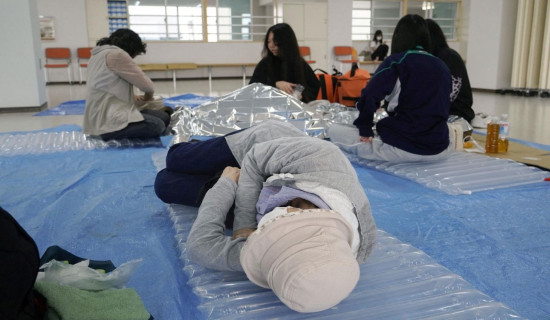- Thursday, 31 July 2025
Upraise Children With Character First
Not long ago, at a reputed private school in Kathmandu, a mother of a seventh grader stood trembling outside the principal's office. When she was finally invited in, her composure crumbled. Through tears, she revealed a heartbreaking reality: her 13-year-old son had become unrecognisable. At home, he scolded her, bit her, spat when angry, used abusive language, and defied every instruction. He was no different at school—aggressive, disrespectful, and disruptive. After several warnings, the school had suspended him for a week. In the meeting that followed, school officials expressed their helplessness. "We're educators, not behaviour specialists," said one staff member. The room fell silent. Unfortunately, this is not an isolated case. Increasingly, both parents and teachers across the country are facing similar challenges. Children today are becoming more defiant, emotionally detached, undisciplined, and often aggressive. Most concerning is the sense of helplessness many adults feel. Despite their love and efforts, they are losing influence and control over their children. Once, the home was a sanctuary of values and discipline. The school was a temple of knowledge and character. Today, both are losing their moral grounding. This raises a difficult but necessary question: Where did we lose our way?
Intentional loving discipline
We place children's present feelings at the centre of everything. We hesitate to say "no". We fear causing discomfort. In trying to be kind, we sometimes become permissive. We allow children to do what they like — even when it is harmful, disrespectful, or misguided because we don't want to be 'controlling'. In doing so, we often fail to give them the guidance, correction, and consequences they need at the right time.
Modern parenting and education have brought critical awareness about child psychology, emotions, and rights, which is good. But we must be careful not to throw away the wisdom of the past in our pursuit of modern ideals.
There was value in how our parents raised us, not because they were perfect but intentional. They dared to discipline, correct, and guide even when difficult or uncomfortable. They kept our future at the centre. That balance of love and control, freedom and boundaries, affection and accountability helped many of us become strong, responsible, and respectful individuals. Today's crisis in children's behaviour, their growing defiance, emotional detachment, and lack of discipline may be partly a result of our unwillingness to provide that same balance. We fail to understand the real spirit and the purpose behind such grooming styles.
We stopped demonising the traditional parenting approach and started understanding it in context. It wasn't about abuse or suppression but about direction, values, and character. We need not unthinkingly return to all old methods but reclaim the wisdom that helped raise grounded, resilient, and respectful human beings.
A combination of changing parenting styles, social pressures, and systemic neglect has contributed to the problem. Many parents, out of love and guilt, tend to overprotect or excessively pamper their children. They normalise bad behaviour in early years, assuming "they'll grow out of it". But these unchecked habits grow roots. When a child reaches adolescence, correcting such behaviour becomes much harder. The early window to "catch them young", the critical phase to instill values, empathy, and discipline, is lost.
Add to this the increasing disconnect between children and their parents. Overburdened with work and responsibilities, many parents substitute presence with presents. Screens become babysitters. Separate meals and separate rooms replace shared dinners. The emotional bond weakens.
Schools, too, are failing to address the root of the problem. Pressured by exam results and academic rankings, many institutions have reduced education to a numbers game. A student who excels in science but lacks self-control or empathy is still celebrated while moral gaps go unnoticed.
Teachers are already overwhelmed with their workload and often don't get the support they need to handle students' behaviour. Their role is primarily limited to teaching subjects, not shaping values. Most schools don't have proper programmes to build students' character and academic skills. This focus on marks and exams can create bright students, not kind or responsible ones. And that's a risky imbalance.
Parenting and schooling
Parents are a child's first teachers. Honesty, kindness, responsibility, and respect must begin at home. Discipline should not be confused with punishment. It means consistency, accountability, and correction delivered with love.
Children do not need endless freedom. They need structured freedom. Saying "no" is as important as saying "I love you". They learn far more by watching how adults behave than from any lesson.
Education is not just about preparing for exams. It's about preparing for life. Schools must return to their deeper mission to shape intelligent students and good human beings. This means schools should integrate character education into every part of students' school lives. Morning assemblies, role plays, student councils, community service projects, and peer mentoring programmes are powerful tools schools could use to develop good character in students. Rewarding values, not just grades, sends the right message.
Teachers are not just content experts; they are moral compasses. Their tone, actions, and responses shape young minds every day. A teacher who treats students fairly, listens patiently, admits mistakes, and handles conflict calmly teaches more about character than any moral textbook ever can.
Nepal stands at a crossroads. Rapid modernisation, urbanisation, and digital exposure reshape how children grow and interact. If we don't act now, we may raise a generation that is brilliant but broken, capable but disconnected from compassion, resilience, and responsibility. Policies must recognise that character is not a subject but the soul of education. Schools should be evaluated not only on SEE results but also on how they nurture ethical citizens.
Education begins long before school and lasts long after it. Its goal is not just to build careers but to build character. Every child is a seed of potential, but how that seed grows depends on the environment, the home's soil, the school's care, and the light of adult role models. Parents and educators should rise and return to what truly matters, shaping not just minds but hearts, because in the end, a child who becomes a good human being is the most remarkable success story of all.
(Adhikari is an education leader, trainer and quality consultant.)



-original-thumb.jpg)



-square-thumb.jpg)









